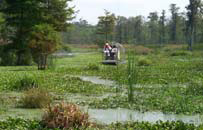
Aquatic plants are an important and beneficial part of lakes and rivers. However, some water plants, especially invasive non-native species that lack natural predators and diseases to keep their growth in check, can develop large nuisance populations. Some of the more common nuisance aquatic plants in South Carolina include hydrilla, water hyacinth, giant salvinia, water primrose, phragmites, and alligatorweed.
Why are invasive plants a problem? Because invasive aquatic plant infestations can be very dense and cover large areas they can harm the aquatic environment and impair a variety of water use activities.
Environmental impacts include degraded water quality, displaced native plant species, increased breeding habitat for mosquitoes and other pests, and imbalance of desirable fish populations.
What is being done? Aquatic weed problems are such a large problem in South Carolina the state legislature established the Aquatic Plant Management Program for the purpose of preventing, identifying, investigating, managing, and monitoring aquatic plant problems in public waters.
The Department of Natural Resources administers the Aquatic Plant Management Program in coordination with the S.C. Aquatic Plant Management Council, a 10-member board representing several state agencies and the governor’s office.
Each year a statewide Aquatic Plant Management Plan is prepared, reviewed by the public, approved by the Council, and implemented using public and private funds. More than 60 public water bodies throughout the state have benefited from these control activities including the Santee Cooper lakes, Lake Murray, Back River Reservoir, Goose Creek Reservoir, the Cooper River, Black River, Pee Dee River, Waccamaw River, and numerous S.C. park lakes. Public comments on the plan are encouraged.
South Carolina, like other states, has adopted laws to prevent the importation, sale, and distribution of specific invasive aquatic plant species known to cause problems.
The South Carolina Noxious Weed Act and State Crop Pest Act provide far reaching powers to “seize, quarantine, treat, destroy, or otherwise dispose of any noxious weed,” imported, distributed, or sold in South Carolina. To further deter persons from spreading nuisance aquatic weeds the law includes fines up to $500 and/or imprisonment up to one year.
The Department of Natural Resources is assisting in the implementation of these laws and others to keep these problem plants out of South Carolina.
Aquatic weed problems are caused primarily by boaters and fishermen unknowingly spreading aquatic weeds from one lake to another and homeowners disposing of water garden and aquarium plants in public waters and private ponds. You can help control the spread of nuisance aquatic plants by doing the following:
When you leave a body of water:
— Remove any visible mud, plants, fish or animals before transporting equipment.
— Eliminate water from equipment before transporting.
— Clean and dry anything that comes into contact with water (boats, trailers, equipment, clothing, dogs, etc.).
— Never release plants, fish or animals into a body of water unless they came out of that body of water.
— Report aquatic weed problems in public waters to the Aquatic Nuisance Species Program, SCDNR (1-803-755-2836).
Here are some actions that home-owners or landowners may take:
You can use mechanical devices such as weed rakes or cutters.
You can cover the bottom with weed mats.
You can manually pull up problematic vegetation.
You can hire a mechanical harvester.
Call the SCDNR Aquatic Nuisance Species Program for information about aquatic weed problems in public waters.
Here are some actions home-owners or landowners can’t take:
Never dispose of or plant invasive species in any waterbody. (There are laws that prohibit the transport or spreading of certain species of plants.)
Never apply herbicides to a public waterbody. (It is against the law, you could be fined or sued.)
Never stock grass carp into a public waterbody. (It is against the law, you could be fined.)
Don’t remove grass carp from a public waterbody. (It is against the law, you could be fined.)

Be the first to comment